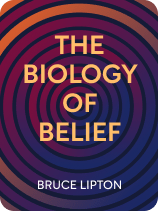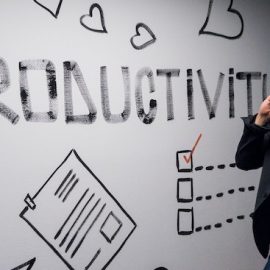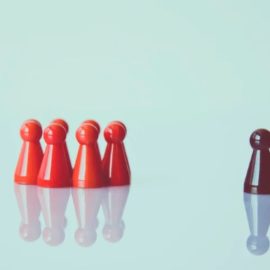

This article is an excerpt from the Shortform book guide to "The Biology of Belief" by Bruce Lipton. Shortform has the world's best summaries and analyses of books you should be reading.
Like this article? Sign up for a free trial here.
Do your genes control you, or do you control them? How do your thoughts affect your cells and health? Where is the brain of a cell actually located?
In The Biology of Belief, Bruce Lipton argues that you have more control over your health and genetic expression than you think. He says that your thoughts and beliefs can have a powerful impact on your body, influencing everything from your immune system to your hormones.
Read below for a brief overview of The Biology of Belief.
The Biology of Belief by Bruce Lipton
In The Biology of Belief, Bruce Lipton challenges the notion that genes determine our destiny. Drawing on decades of research in cell biology and epigenetics, he explains how our beliefs and thoughts can have a profound impact on how our genes are expressed, and therefore on our physical and mental health.
Bruce Lipton is a cellular biologist who is best known for his groundbreaking stem cell research at Stanford Medical School and his work in the field of epigenetics (how your behavior and environment can affect the functioning of your genes). He’s taught at the University of Wisconsin School of Medicine and St. George’s University in Grenada. Lipton is also the author of Spontaneous Evolution (2010), which explores the connection between biology and consciousness, and The Honeymoon Effect (2014), which takes a look at how quantum physics and biochemistry can help us navigate romantic relationships.
In this book, Lipton presents evidence from his research on cellular life to support the idea that we create our reality by how we interpret and react to our environment. The key ideas from this book offer a new perspective on the relationship between our minds and our bodies by suggesting that we can use this knowledge to improve our health and well-being.
Lipton begins by providing an overview of the traditional view of genetics and biology, which holds that our genes determine most of our characteristics. He argues that this view is outdated and limited, as it doesn’t take into account the many environmental factors that can affect gene expression. He then explores the relationship between our beliefs and our physical health, presenting evidence that our thoughts and beliefs can have a powerful impact on our bodies, influencing everything from our immune systems to our hormones.
Finally, Lipton delves into research on energy and brain waves to examine how our unconscious programming influences our behaviors. He argues that we spend 95% of our lives acting from a subconscious program that was instilled in us in early childhood. He explains that this subconscious programming is the basis for how our brains interpret the world around us, and that our brain’s interpretations of the world create chemical signals that direct all of our cells’ behavior. Lipton says that if we can change our beliefs and thoughts, we can change our physical health and ultimately take more control over our lives.
Scientific Paradigms as Dogma
For much of his career, Lipton says he has found himself at odds with the scientific community because his ideas have challenged prevailing scientific paradigms. In particular, he proposed the principles of epigenetics long before it was an established field of study. As time goes on, however, he says research has continued to support many of his ideas. The problem, as he explains it, is that the scientific community can be dogmatic in holding on to established paradigms.
Darwin vs. Lamarck: Setting the Stage for Understanding Genetics
One of the foundations of the modern scientific worldview—particularly in the biological sciences—is Darwin’s theory of evolution. This is a model based on competition for survival and genetic determinism, or the idea that your genes have a high degree of control over your fate. Lipton says Darwin’s theory has shaped the modern Western worldview to our detriment. He explains that the science of epigenetics, established in the 1990s, has shown that the environment plays a much bigger role in shaping us than was previously thought.
Cell Behavior Is a Microcosm of Human Behavior
Lipton says his research on cells since the 1970s has shifted the way he thinks, not only about biology but about life. His research has taught him that cells have intelligence and live in cooperative communities, working together in response to the signals they get from their environment. He sees cells as a microcosm of the human world, from which we can learn a great deal about ourselves, our relationships, and our societies.
The Brain in the Membrane
Perhaps the most revolutionary theory Lipton proposes about cells is that the cell’s “brain” lies not in its nucleus but in its membrane, the outer layer that envelops it. This is an important concept underlying all of his work because it explains why the cell’s environment is the force driving its behavior.
Traditional cell biology says that DNA provides the “program” that directs a cell’s behavior, and all of your cells act according to this program to determine almost everything about you. Each of your cells contains a copy of your DNA, which resides in the nucleus of the cell. So cell biologists assumed that the nucleus of a cell must be its central controlling mechanism, akin to its brain.
However, Lipton observed that when you remove a cell’s nucleus, it doesn’t immediately die—it continues to function. The only thing the cell can’t do without its nucleus is reproduce. He concluded that the nucleus of the cell is more akin to the body’s reproductive organs. If it were akin to the brain, the cell would be unable to live without it.
Lipton noted that the cells of the simplest organisms, like bacteria, don’t even have a nucleus, and yet they live and behave much like more complex cells (they just reproduce differently). But the one feature characteristic of the cells of all living things is that they have a membrane. This insight led him to observe that the cell’s membrane interprets and responds to signals from its environment, in much the same way our brains interpret what’s going on around us and decide how to respond. Lipton concluded that the membrane of the cell is actually directing its behavior, based on environmental information. The environment of your cells is your body chemistry. Your cells react to the chemical and energetic signals in your body, many of which are created by your thoughts, beliefs, and emotions. And this can actually affect the expression of the genetic material inside the cell’s nucleus.
Your Thoughts Contribute to Your Cells’ Environment
The idea that thoughts can have a direct effect on the material world has been largely rejected in the scientific worldview since the 1600s, when French philosopher Descartes proposed that the mind and body are distinct realms. The suggestion that your beliefs can affect your body has typically been dismissed as magical thinking, and Lipton recounts facing such reactions himself. But he says science now solidly confirms the inseparability of mind and body.
Lipton explains that the mind-body dynamic works like this:
- Your mind perceives what’s happening around you.
- Your brain cells interpret that information and respond by secreting chemicals.
- Those chemicals circulate through your bloodstream to your whole body, becoming the environment in which all of your cells operate.
- How your cells operate in response to those chemical signals influences how you’ll behave and determines your overall health and well-being.
Lipton explains that the neurochemicals created in your brain are constantly affecting your cellular community. One of the ways this can negatively impact you is through the toxic chemical environment created by chronic stress.
Energy Influences Matter
Perhaps more controversially, Lipton argues that it’s not only your body chemistry that influences your cells—it’s also your body’s electromagnetic energy. He says the Western scientific worldview tends to ignore the role of energy in health because it’s often not measurable and quantifiable. He points out that although research has shown that living matter does energetically influence other living matter, scientists tend to reject this research as unscientific because they can’t conclusively explain how it works.
Lipton says that energy affects almost every aspect of cell behavior. Every biological process in your body is affected in some way by different frequencies and patterns of electromagnetic energy—including DNA regulation, cell division and differentiation, nerve growth, and hormone secretion. This is why stimulating the brain with electrical current, such as with electroconvulsive therapy (ECT), can be useful for mental health treatment.
Lipton says every living organism interprets its environment by sensing energetic signals around it. This is observably true of cells, plants, and animals. Humans, however, have evolved to rely so heavily on verbal communication that most of us have lost conscious touch with our energy-sensing ability. Lipton points out, though, that some indigenous peoples who still live their traditional lifestyles have retained this ability and demonstrate hypersensitivity to the energy around them.
Lipton emphasizes the importance of understanding that brain wave states are energy operating at different frequencies, and these contribute to your health and well-being. When your brain wave state changes, Lipton explains, you can change the communication and environmental signals happening throughout the body. In particular, he stresses that understanding brain wave states is crucial for tapping into the subconscious mind, where most of our problems actually originate.
Your Subconscious Program Is Running the Show
Lipton argues that your mind, rather than your DNA, is the source of your behavioral programming. More specifically, he says the most influential force in your life is the beliefs embedded in your subconscious—programming that was firmly in place by the time you were six or seven years old.
Lipton explains that our brains are particularly programmable before age seven because children at this age are generally in a different, more receptive, brain wave state than adults. Our brain waves change throughout life like this:
- Birth to age two: Babies’ brains are in a delta wave state for most of their first two years of life.
- Ages two to six: Children in this age range have increasing periods of theta wave states.
- Ages seven to 12: Alpha wave states tend to dominate.
- After age 12: We spend most of our waking lives in beta wave states.
The theta wave state is associated with hypnotism and deep meditation. This is when information can go directly to the subconscious mind. So because children are often in this state before age seven, they absorb everything around them and it becomes stored in their subconscious. This means that we live the rest of our lives based on beliefs that were instilled in us by other people before we were even seven years old.
The problem with that, Lipton argues, is that many of those beliefs are negative and limiting, cause us stress, and they conflict with what we consciously want to do with our lives—especially if we’ve experienced trauma in childhood. Most children at some point absorb messages that the world is unsafe and threatening, that they’re unloved or unworthy, that many possibilities are not open to them, or that the world is full of illness, violence, and death.
Lipton clarifies that parents aren’t to blame for this—most parents love their children and do the best they can with the programming they received. Children absorb these messages from the social environment as a whole, even when they do have loving parents.
Recall that your mind is constantly interpreting your environment and sending signals to all of your cells. Lipton says it’s largely your subconscious mind that’s doing this interpreting. This means that where you may consciously perceive no threat at all, your subconscious mind may be reacting to information programmed into you as a child and interpret the world through a lens of fear and insecurity. This can drastically affect your health by causing chronic stress.
Lipton says that while you may consciously believe you’re competent and intelligent, you may have been subconsciously programmed to believe you’re stupid and incapable of success. This will undermine your confidence and your chances for success in life without your even being aware of it. He believes that most of our disease, suffering, and inability to achieve what we want in life is because this subconscious programming controls us much, even more so than our genes and our conscious mind.
Implications for Healing
You may feel defeated after learning that your actions are triggered by unconscious programming that’s been embedded in you since early childhood. But Lipton says he’s optimistic about our individual and collective capacity for change. He ends the book by saying we have the capability to reprogram our minds and to do better for our own children, and that we should join together as a global community in our healing efforts. In this section, we’ll look at the advice Lipton offers based on what he’s learned from his work with cells.
Individual Healing: Programming and Reprogramming
On the individual level, Lipton offers two major pathways for healing: 1) approaches to parenting that program our children’s minds in healthy ways, and 2) ways to reprogram our own minds with mindfulness and “energy psychology” techniques.
Collective Healing: Hope for the Future
Finally, Lipton says he’s optimistic about the future of humanity, based on the history of life on the planet and how resilient it can be when it joins together in cooperative communities. He says we can learn a lot from cells about how to move forward as a global human community.
Life on Earth consisted only of single-celled organisms for billions of years before they began joining together to form multicellular clusters, which eventually became the complex higher life forms we have today. Lipton suggests that it was likely some sort of environmental change that created pressure for those single-celled organisms to join together to increase their chances of survival.
Cooperation in this way helped them survive because when they were joined, their collective membrane surface area increased, giving them greater ability to detect and respond to environmental threats. He says cells give us a model for understanding how joining together in cooperative community may give us our best chance for survival.
Lipton points out that humanity’s survival is threatened because of our own destructive behaviors. We’ve radically altered the environments we evolved in, so that means we’re now living in an environment we’re not adapted to. And when that happens to any living organism, it has only two options—die or change. Lipton suggests we join together as a global community and make the necessary changes to ourselves. At the cellular level, we’re all exactly the same—human. We must let go of the false concepts that divide us and, like our single-celled ancestors, join together as one to find a new way to thrive.

———End of Preview———
Like what you just read? Read the rest of the world's best book summary and analysis of Bruce Lipton's "The Biology of Belief" at Shortform.
Here's what you'll find in our full The Biology of Belief summary:
- That your mindset matters more than your genetics when it comes to health
- How your thoughts affect your immune system and hormones
- Why humans should join together in a community to aid survival






